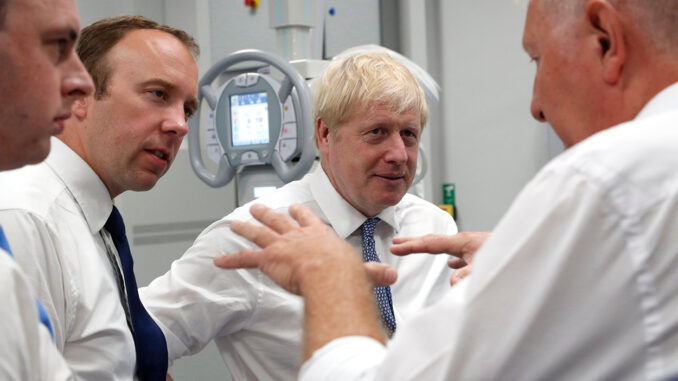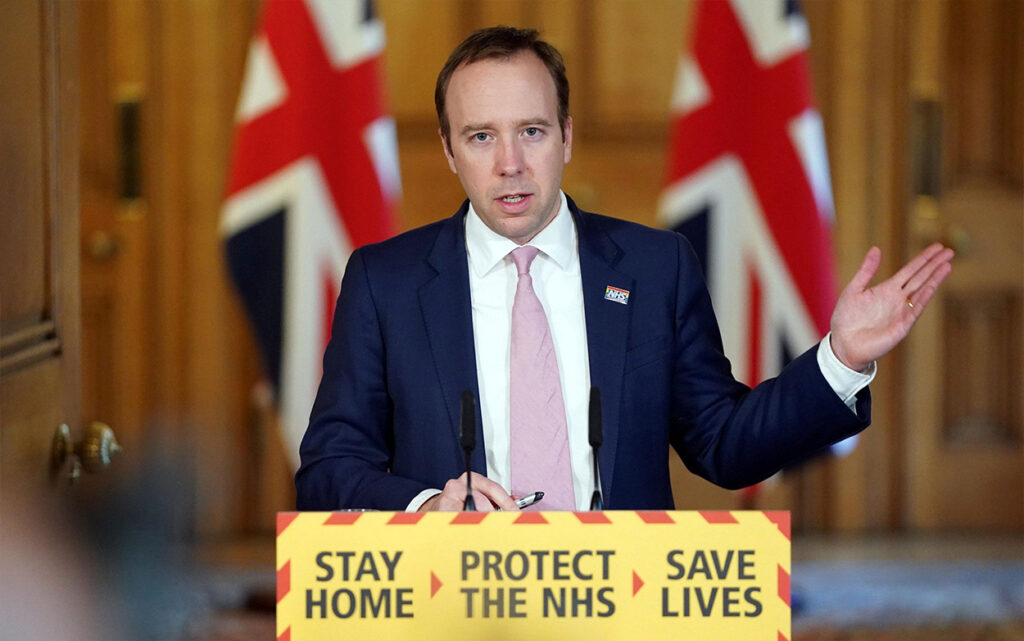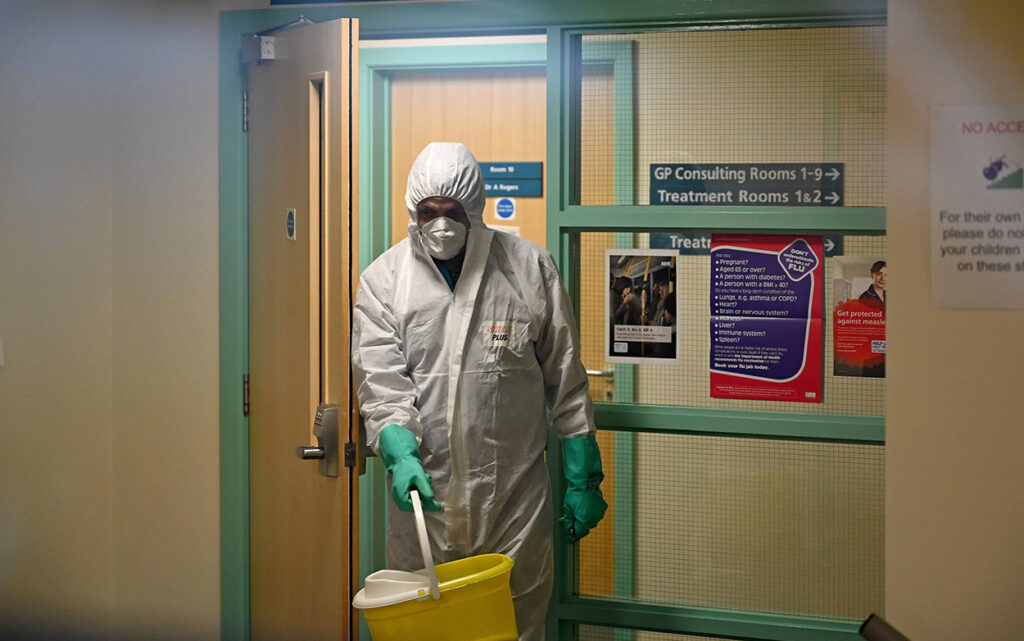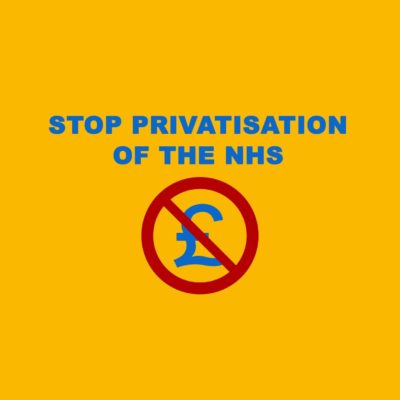
It has never been clearer than during this pandemic just how important the NHS is to the health and safety of the public. Yet the NHS was left to face the Covid pandemic already severely weakened by Government policy. Now they're using the crisis to escalate plans for structural change.
FIND OUT HOW YOU CAN RESPOND TO THE CONSULTATION
The scale of the ongoing tragedy is overwhelming – over 75,000 excess deaths (63,000 directly Covid-related by early December), 22,000 in care homes, 3600 excess deaths in home settings and over 600 NHS and care staff. For many, Covid-19 has exposed the need for urgent restoration of a public health system and fully funded and an expanded publicly provided NHS.
We need urgently restored, upgraded hospitals, more beds and staff, far better-funded primary (GP) care and community services, including dramatically improved mental health and disability services. However, Covid-19 has also revealed the heightened dangers of social and economic inequality, disproportionately disadvantaging people of BAME origin, disabled people, those relying on social care and support in their own homes and communities or in care homes. But against this backdrop the Government, rather than learning the lessons we believe are so plain, is steaming ahead with the plans to restructure the NHS. But what does this really mean for the NHS and for those of us who want it to be publicly owned and run?
CCG mergers and Integrated Care Systems
NHS England (NHSE) has pushed through a policy to merge what were 210 clinical commissioning groups (CCGs) created by the Health & Social Care Act 2012 (HSCA) into 42 merged CCGs coterminous with the 42 geographically-based integrated care systems (ICSs) that NHSE is imposing by 2022. Not all areas have agreed CCG mergers and only 18 ICSs are in existence to date. Those areas where CCGs have not yet merged or refused to do so, are being coerced into doing so. Then each area must also have its ICS in place. Other centralising plans are underway - for example the imposition of 42 pathology networks.
Start point: this is a hijack
NHS England has hijacked the word 'integrated' in 'Integrated Care Systems' and effectively inverted its meaning. In contrast, campaigners have been demanding the scrapping of the 'market' in the NHS and the reintegration of services, ever since 1989-90 when Margaret Thatcher’s “internal market” reorganisation carved the NHS up into purchasers and providers, and sliced off long-term care for mental health and elderly patients from the NHS - almost complete privatisation - in the so-called “Community Care reforms” from 1993.
Rather than the reintegration of England’s health services into a unified publicly owned, controlled and provided NHS, or combining health with some aspects of social care through local boards as has taken place in Scotland and Wales, NHS England has taken a very different path.
'Integrated Care Systems' are the ultimate misnomer. They are the latest incarnation of a notion that originated in the 'accountable care organisations' (ACOs) referred to vaguely in the 2014 Five Year Forward View - the subsequent 44 STPs “Sustainability and Transformation Plans” (later becoming 'partnerships') that NHS England ordered to be developed in secret during 2016. The latest instruction in last year’s Long Term Plan is for 42 ICSs. An ultimate misnomer because they:
- involve a further DIS-integration of the NHS into more contracts, including many with private providers
- are not focused on patient care but on financial balance sheets
- are only ‘systems’ insofar as they allow for greater top-down control by NHS England over the decisions and activity of each locality
- undermine and obstruct any local accountability
- open the door to new forms and levels of privatisation

Fighting against ICSs
The challenge for campaigners fighting against ICSs is to find ways to draw public attention to what have been secretive and uneven changes, explain their significance and identify those issues that local people might see as reasons to take political action - and feel that this is likely to make a difference. This challenge is a tough one, since opposition to ICSs must be conveyed in an accessible way, and gain publicity in the midst of a pandemic by competing with much more visible issues such as high-profile large-scale diversion of tens of billions of public funds to private contractors (£12 billion on Deloitte/Serco test and trace), dodgy private ‘go-betweens’ (£15 billion of PPE contracts) and private hospitals (upwards of £3 billion this year with up to £10 billion promised over the next 4 years).
Points to consider
- Being aware that complex and obscure questions, at a time when NHS staff and public alike have been focused on the immediate and pressing issues highlighted by Covid-19, staff shortages, waiting times, under-funding and privatisation, may have a limited appeal to many.
- The public may be unwilling to defend CCGs, established from 2013 as a result of unpopular legislation which is still poorly understood; many CCGs have also acted in high-handed and undemocratic fashion, making them unlikely bastions of local accountability
- Local government is weakened in many areas, its confidence in taking any leading role in challenging ICSs undermined, and local scrutiny and accountability has been eroded after more than a decade of brutal spending cuts
- This is made even worse by the failure to secure additional government funding to address local Covid-19 response, the priority to challenge Government for control over local test and trace, and the relatively limited number of councillors who have detailed knowledge of the NHS
- The problem posed by the lack of any overt activity by most of the 18 ICSs that have been established - they mainly function under the radar of local news, making it even more difficult to galvanise local interest or to demonstrate what dangers they might pose in future
None of these is a reason why we should not attempt to campaign on the threat posed by ICSs, but the question of how best to mount effective campaigning, given our limited resources, must also be given thought. The main underlying issue for campaigners remains the need for greater and sustained funding with increases to keep pace with growing population needs (an issue that pre-dates ICSs). A suggested basis for possible campaign tactics around ICSs is set out below.
-
- Centralisation and loss of local democracy
ICSs are set up from top down as a bureaucratic fait accompli, with no public consultation or support. They involve not only CCG mergers, but also even larger-scale mergers of hospital and of mental health trusts – each merger cutting any genuine local links and accountability that might have survived the past 30 years of reorganisations and market-style policies. They are not going to be responsive to demands or pressures from local communities.
-
- Loss of accountability
ICSs lack any legal standing or accountability and are part of a wider NHSE project to enforce tighter regional-level control over cash-limited budgets, impose restrictions on the range of services provided by the NHS, and drive through new data-led schemes for ‘population health management’ along with a ‘digital first’ agenda that create huge new lucrative openings for private sector bodies while threatening to leave millions of people increasingly excluded. ICSs may be given new legal powers to police cash limits (‘control totals’) and force trusts or commissioners to carry through cuts, closures and reconfigurations in the quest for cash savings. There would be further and increasing restrictions on the range of services provided and covered by the NHS, with growing lists of ‘procedures of limited clinical value' – for example, forcing more and more patients requiring elective treatment to pay privately or go without.
-
- ‘Contract killing’ the NHS
NHS England has set up the Health Systems Support Framework (HSSF), to facilitate even more rapid and easy involvement of private sector management consultants, number crunchers and other providers in the new ICSs. The HSSF is a list of accredited companies (plus a few NHS providers) offering trusts and CCG a range of services that can “support the move to integrated models of care based on intelligence-led population health management”. The HSSF has established a series of “framework contracts” through which companies seeking contracts can secure pre-approval, allowing contracts to be awarded without a tendering process, either with no competition or through a ‘mini-competition’ between companies on the list. Framework contracts also allow ICSs to force through more outsourcing/private provision of direct clinical care.
-
- Keeping close tabs on the private sector
One local newspaper publicised the role of a Deloitte consultant as a potentially voting ‘lay member’ of the NE London Commissioning Alliance (ICS). If local media could be persuaded to latch on to similar examples of untoward interference by the private sector in the running of the NHS it’s possible some wider public anger could be generated, possibly drawing councillors and MPs into the fray. This is an area that needs vigilance and the eagle-eyed attention of local campaigners.
-
- The emperor’s new clothes are a con
Find ways to publicise the fact that many of these new approaches touted as solutions by ICSs just don’t work. The Lowdown reported new research in the USA earlier this year which exposed the lack of evidence that costly and complex data-led attempts at ‘population health management’, or targeting the small number of patients with complex medical and social needs (so-called ‘super-utilisers’ who account for a large proportion of health care costs) can either reduce demand or cut costs.
NHS England, the 2012 Act and impending new legislation
NHSE has argued for more than two years for legislation to make partial reforms to the 2012 HSCA, most notably in dropping the legal requirement for commissioners to put services out to competitive tender. KONP and other campaigners have supported moves to scrap competitive tendering, while stressing that, in the absence of wider legislation to roll back the Act and reinstate the NHS, such moves would not be sufficient to end privatisation or the fragmentation of the health care market.
However, we have now had eight months of government using emergency powers related to the Covid pandemic to allocate tens of billions in contracts with no competition or public scrutiny – and we have seen just how disastrous contracting without competition or regulation can be. In addition, with NHSE pushing forward bigger and more wide-ranging ‘framework contracts’ it is clear that it is firmly committed to more privatisation.
If such proposals are brought forward again we should not support them: with or without competition regulation, carving up the NHS into contracts does nothing to integrate services and only serves to benefit the private sector. The only satisfactory way to amend the requirements for commissioners to put services out to tender would be as part of a process of bringing all outsourced services back in-house and scrapping the costly and wasteful purchaser-provider split.

Current NHSE proposals
NHSE is now proposing that an ICS could either make legally binding decisions in a joint committee with their CCG, or – the favoured option – replace the CCG, something that is already causing consternation among GPs. We need to be alert and campaign for all NHS bodies to be statutory and wholly public bodies, with no private interests on the decision-making boards. In addition, the KONP/HCT Rescue Plan argues for the repeal of the 2012 Act (which created CCGs and NHS England) and to:
... reverse the fragmentation that has flowed from [the Act], scrap the regulations that continue to carve up local services into piecemeal contracts, and begin to bring outsourced and privately provided services back in-house. … Commissioning as it has developed since the “internal market” was established in 1990 needs to be abolished. Instead, the function of planning, allocating resources and provision of services should be brought together in unified local health boards, which should be established as accountable local public bodies based on local government boundaries, and working closely with local borough, unitary and county councils.
Campaigning challenges and opportunities
So how do campaigners best respond to these plans and get our message to the general population? How do we aid the transition from passive clapping for the NHS to active demands for a n NHS wholly in public hands?
We have to engage with the wider general public and explain the already existing pressures on the NHS, and make the connection between the everyday experiences of people in health and social care and the political failures of this government. We have to explain the dangers of privatisation and outsourcing in general too, something which has been easier to get across over recent months, with the obvious disaster of SERCO being awarded the contract to provide an effective Test and Trace service. Its failure has in many ways made the point for us, but even this is not enough. It is in this broader context of ellucidating the wider dangers of privatisation that we can and must start to lay out the multitude of ways this project is being carried out by the Government and by NHS England.
This move towards restructuring is part of that general trend and must be resisted wherever it is reasonable for us to do so. There are a number of aspects of ICSs that lend themselves to being campaigned against. Calling for the abolition of ICSs has to be done in the context of demanding the repeal of the 2012 HSCA, and the abolition of the internal market through an NHS reinstatement bill and, perhaps most importantly of all, communicating to the widest possible demographic the dangers of privatisation. Meanwhile, just how far the Government want to push current reforms is uncertain. However, we must not allow them to go ahead under the smokescreen of improving the capacity of the NHS to respond to this pandemic.
The Government must learn the true lessons of its failures during the pandemic, not use it as an opportunity to achieve its pre-existing ideological aims.
Further information
Find out more in Keep Our NHS Public's briefings on Integrated Care Systems:
- Read more about accountable care organisations and what can be learned from the USA
- And here, the long read on Integrated Care Systems
- The Lowdown has John Lister's latest article on ICSs: NHS England pushes for “integration” … but not as we know it







These proposals should be resisted at all costs and by any means.
Has the idiot leant nothing from this pandemic? He’s the biggest danger to life, never mind pushing it on the public that they are not following the rules!